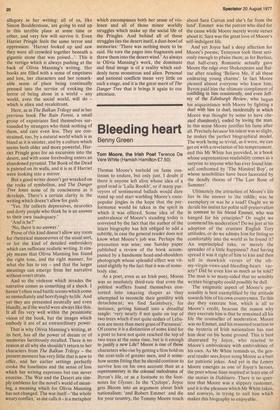Bleeding heart
Benny Green
Tom Moore, the Irish Poet Terence De Vere White (Hamish Hamilton £7.50)
Thomas Moore's toehold on fame continues to endure, but only just. I doubt if there is anyone left alive whose idea of a good read is Talla Rookh', or if many purveyors of sentimental ballads would dare stand up and start warbling Moore's oncepopular jingles in the hope that the performance would be taken in the spirit in which it was offered. Some idea of the ambivalence of Moore's standing today is conveyed by the fact that the author of the latest biography has felt obliged to add a subtitle, in case the general reader does not know what Moore's job was. Perhaps the precaution was wise; one Sunday paper published a review of the book accompanied by a handsome head-and-shoulders photograph whose splendid effect was vitiated slightly by the fact that it was of somebody else.
As a poet, even as an Irish poet, Moore was so resolutely third-rate that even the politest wafflers found themselves contorted into amazing shapes as they attempted to reconcile their gentility with detachment; we find Saintsbury, for instance, getting himself into a dreadful tangle: 'very nearly if not quite on top of two trees which if not quite cedars of Lebanon are more than mere grass of Parnassus'. Of course it is a distinction of some kind for a poet to have not quite reached the top of two trees at the same time, but is it enough to justify a new Life? Moore is one of those characters who rise by getting a firm hold on the coat-tails of greater men, and it somehow seems fitting that he should continue to survive less on his own account than as a supernumerary in the colossal melodrama of Byron's life, or as a footnote to the footnotes for Ulysses In the 'Cyclops', Joyce gets Bloom into an argument about Irish nationalism: 'and Robert Emmet and die for your country, the Tommy Moore touch about Sara Curran and she's far from the land'. Emmet was the patriot who died for the cause while Moore merely wrote verses about it; Sara was the great love of Moore's self-indulgent life.
And yet Joyce had a deep affection for Moore's poems; Tennyson took them seriously enough to ptaise them; as for Berlioz, that half-crazy Romantic actually gave Moore the edge over Shakespeare and Balzac after reading 'Believe Me, if all these endearing young charms'. In fact Moore pleased almost everyone who knew him; Byron paid him the ultimate compliment of confiding in him consistently, and even Jeffrey. of the Edinburgh Review, who began his acquaintance with Moore by fighting a duel with him (a duel, incidentally in which Moore was thought by some to have cheated shamlessly), ended by loving the man. In this sense Moore justifies his fame after all. Precisely because his talent was so slight, he makes the perfect biographical model. The work being so trivial, as it were, we can get on with a revelation of his temperament, and this Mr White has provided, in a book whose unpretentious readability comes as a surprise to anyone who has ever found himself confronted by 'The Minstrel Boy', or whose sensibilities have been lacerated by the deadly thorns of 'The Last Rose of Summer'.
Ultimately the attraction of Moore's life lies in the answer to the riddle; was he exemplary or was he a toad? Ought we to deride his instint for polite self-preservation in contrast to his friend Emmet, who was hanged for his principles? Or ought we commend his moderation? Do we jeer at his adoption of the crustiest English Tory attitudes, or do we admire him for fitting so comfortably into the world as he found it? An unprincipled rake, or merely the spreader of a little happiness? And having spread it was it right of him to kiss and then tell in mawkish verses of the ohmy-virgin-vows-and-bleeding-heart variety? Did he even kiss as much as he told? The man is so many-sided that no sensibly written biography could possibly be
The enigmatic aspect of Moore's personality is best exemplified by the attitude towards him of his own countrymen. To this day they execrate him, which is all to Moore's credit, beacuse the reason why they execrate him is that he remained all his life the counseller of moderation. Moore was no Emmet, and his reasoned reaction to the hysteria of Irish nationalism has cost him dear on his home ground. This is best illustrated by Joyce, who reacted to Moore's ambivalence with ambivalence of his own. As Mr White reminds us, the general reader sees Joyce using Moore as a butt for patriotic jokes. And yet in the Letters Moore emerges as one of Joyce's heroes, the poet whose lines inspired at least one of the stories in Dubliners. There is no question that Moore was a slippery customer, and it is the pleasure which Mr White takes, and conveys, in trying to nail him which makes this biography so enjoyable.































 Previous page
Previous page